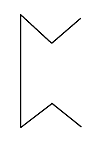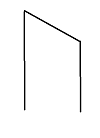 Pertho
PerthoElder Futhark:Proto Germanic, meaning unknown
Younger Futhark: na
Anglo Saxon Futhorc:Old English, meaning unknown (but there are some assumptions, which it would be great for us to discuss below)
Phonetic value: 'p'
Pronunciation: this awesome website with recordings of Old English vowels and diphthongs. It's amazing and I think anyone who actually finds the pronunciation interesting
Now you all reply and add your insights...


Leave a comment: